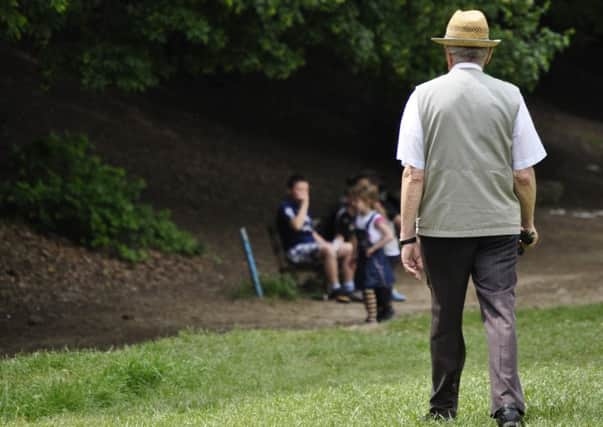Exercising your right to life is one of the benefits of new way of looking at how we live with prostate cancer


Recent figures indicate that nearly one in two men will be affected by prostate disease at some stage of their lives. One in ten will have a lifetime risk of developing prostate cancer, now the most common cancer in men.
Coping after “bad news” can be equally hard. In Scotland we have superb medical staff and effective new treatments, while the Edinburgh & Lothian Prostate Cancers Support Group (ELPCSG) plays its role in giving support to men and their carers. But what options are there for patients to take a measure of personal ownership of their own illness?
Advertisement
Hide AdAdvertisement
Hide AdPerhaps one significant clue might come from research being carried out by Dr Liam Bourke, principal research fellow at Sheffield Hallam University. When Dr Bourke was working on his PhD on lifestyle changes in men with advanced prostate cancer, the standard advice for patients with this and other types of cancer was “rest is best”. But the early findings of his research indicated that this view was not evidence-based, and that exercise was found to have resulted in a clinically measurable improvement in the cancer-specific quality of life for patients.
According to Dr Bourke, the evidence suggests that men who are physically active after a prostate cancer diagnosis have better cancer survival than men who are not. It’s not clear at this point how this comes about, but it could be that exercise affects the way some genes regulate cancer cell growth and DNA repair.
This work has resulted in the Pantera study, funded by Cancer Research UK. It will focus on 50 men who have the disease, but whose cancer has not spread from the prostate.
The Pantera study will involve half of the men undertaking two-and-a-half hours of moderate aerobic exercise every week for 12 months. The remaining half will be given information about the benefits of exercise for cancer patients but will have no supervised sessions.
Results should be available by the summer of 2017, and the hope is that it will lead to a full-scale trial looking at the potential benefits of combining active surveillance and exercise for some prostate cancer patients. This might in turn lead to exercise training being introduced as a possible new NHS treatment for prostate cancer.
There is medical interest in Scotland in Pantera study. Dr Duncan McLaren, consultant oncologist at the Western General Hospital in Edinburgh, describes it as “very valuable”, adding that there may be an effect upon the immune system, which in turn may have direct benefit on the progression of disease.
He points out a number of benefits to be gained already from taking regular exercise: “Treatment with hormonal therapy will increase body mass and increase the risk of metabolic syndrome (secondary diabetes and increased cardiovascular risk). Exercise can help reduce weight gain and hence risk. It increases bone density and muscle mass, both of which can fall with hormonal therapy.”
The practical advantages to patients would appear clear enough, but how to persuade them to take that first step and engage with their own health in this way? For Dr McLaren, one attraction might be as great as any: “Exercise also makes you feel better!”
Advertisement
Hide AdAdvertisement
Hide AdIt’s a view shared by both the Edinburgh and West Lothian sections of the ELPCSG. Iain Sime leads the walks for the former with a commitment to “light exercise, social contact and local information”.
According to Sime: “The aim is to assist people in coping with prostate cancer, helping them to realise that they are not on their own and that there is a life beyond being diagnosed. One of the strongest aspects of this initiative is the genuine camaraderie, friendship and mutual understanding within the group, partly through having a common condition. Each time we go out we start with a coffee and finish with lunch.”
It’s a view echoed by Eric Illingworth in West Lothian, who also feels that a significant benefit can be gained from meeting and mixing with others while keeping as fit and active as you feel able.
“We all know about the benefits of exercise,” he says, “and I find that walking is one of the best exercises. Everyone can start at a level that suits their ability and build from that base.”
So doctors and patients in agreement that regular exercise really can help men cope with prostate cancer, and perhaps also give them an even better chance of survival.
l Mike Shaw is a committee member at ELPCSG
l The aim of the Edinburgh and Lothian Prostate Cancer Support Group (ELPCSG) is to provide support to patients and their families and carers by holding regular meetings in Edinburgh and West Lothian. Further information is available on our website: www.elprostatecancersupport.co.uk
You can also e-mail at [email protected]